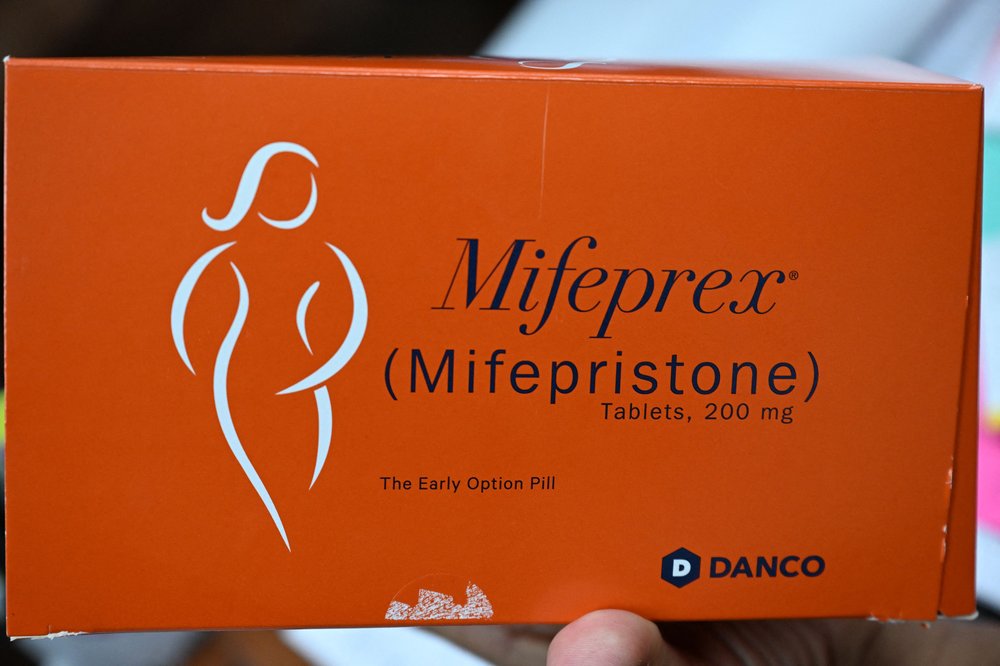A Texas judge suspends main abortion pill nationally: What it means for NY access
April 7, 2023, 8:36 p.m.
In NY, getting an abortion will be ‘a bit more arduous,’ following the Texas judge’s decision. A separate injuction from Washington state doesn’t cover New Yorkers.

A federal judge in Texas granted a request from anti-abortion groups Friday to suspend access to a longstanding drug that’s used to end pregnancies — a ruling that impacts availability even in abortion havens like New York and New Jersey.
The decision places restrictions nationwide on the drug mifepristone, which regulators approved for use more than 20 years ago.
The decision from Judge Matthew Kacsmaryk to limit access to the pill — which is also used for managing miscarriages — comes as advocates and politicians in New York are trying to make abortion medication more widely accessible. Judge Kacsmaryk gave the Biden administration seven days to appeal, and CNN reported Friday evening that White House lawyers were reviewing the matter.
“Simply put, FDA stonewalled judicial review — until now,” Judge Kacsmaryk wrote in his decision. “Before Plaintiffs filed this case, FDA ignored their petitions for over sixteen years, even though the law requires an agency response within “180 days of receipt of the petition.””
Almost immediately in response, a separate federal judge in Washington state issued a ruling to maintain access in 17 states and Washington D.C., but New York and New Jersey are not among them. This injunction, issued by Judge Thomas O. Rice of the Eastern District of Washington, was in response to a lawsuit filed by attorneys general in those jurisdictions.
Gov. Kathy Hochul and New York Attorney General Letitia James decried the Texas ruling and reassured New Yorkers that access to abortion procedures remains intact.
"I am horrified by a federal court ruling that seeks to restrict access to mifepristone, a safe and effective form of abortion medication that has been used by more than five million people since the Food and Drug Administration approved it more than two decades ago,” Hochul said in a statement. “This unprecedented ruling not only overrides the FDA's evidence-based scientific approval process, it also alarmingly opens a new door to politicizing medicine.”
“Let me be clear: abortion continues to be legal in New York and New York will remain a safe haven for anyone seeking abortion care,” James stated. “The fight for reproductive justice is not over.”
New Jersey Gov. Phil Murphy likewise said his administration would "continue to fight any attempt to restrict access to reproductive health care."
None of the officials mentioned Rice’s injunction, which retains the use of mifepristone in Washington state, Oregon, Arizona, Colorado, Connecticut, Delaware, Illinois, Michigan, Nevada, New Mexico, Rhode Island, Vermont, District of Columbia, Hawaii, Maine, Maryland, Minnesota and Pennsylvania.
The path here and what happens now for New York
The Alliance for Hippocratic Medicine, a coalition of anti-abortion groups that filed the case in November to the Northern District of Texas, argued that the U.S. Food and Drug Administration did not adequately assess the risks of mifepristone when it was approved in 2000.
At the time, the FDA deemed mifepristone safe and effective for abortions when used in combination with the drug misoprostol, a conclusion backed by myriad studies. Medication abortion is now the most common way to end a pregnancy in the United States, accounting for more than half of the abortions nationwide. Research has found that serious adverse events such as hospitalization or infection are rare.
During the COVID-19 pandemic, the U.S. Food and Drug Administration began allowing mifepristone to be prescribed via telemedicine and delivered by mail, rather than requiring an in-person visit. In January, the Biden administration made the change permanent.
Since last fall, when Alliance for Hippocratic Medicine filed its case, health care providers in New York and other parts of the country have been discussing how to adjust the protocols for medication abortion to use misoprostol only. That drug has FDA approval to treat gastric ulcers and can be used off-label. But research shows that misoprostol is somewhat less effective on its own.

“It can take longer from the beginning to the end, and it's a bit more arduous in terms of just repeating doses until the medicine works,” said Dr. Linda Prine, a New York-based physician who co-founded the national Miscarriage and Abortion Hotline, which provides support to those self-managing miscarriages and abortions.
Prine said she has advised patients on using a misoprostol-only regimen in the past when there has been a shortage of mifepristone. “We did get more calls about about whether or not the process was complete,” Prine said. “It seemed to us that people had more difficulty assessing whether or not their abortion had worked.”
Prine also works with Aid Access, a group that helps people order abortion medication online. The group already ships mifepristone from overseas to those living in states where abortion is restricted, and founder Dr. Rebecca Gomperts told Gothamist in February that the organization would continue to send the medication to the U.S. even if FDA approval was revoked. But getting abortion medication from abroad can take weeks.
Those in restricted states have also been able to obtain mifepristone through the mail from within the U.S. using forwarding addresses based in legal states.
Can locals and out-of-staters still get abortions in New York?
In states where abortion is legal, people will also be able to end a pregnancy with a procedure in a clinic, rather than using medication. But the block on mifepristone comes at a time when New York advocates and officials have been trying to elevate access to abortion medication — for both locals and citizens in more restrictive states.
In New York City, Mayor Eric Adams announced in January that abortion pills would be made available for free at a handful of city-run clinics – just one of the options available to residents, who can call the city’s Abortion Access Hub hotline for guidance.
At the state level, the New York Senate recently passed a bill that would provide legal protections to New York clinicians who use telemedicine to prescribe abortion medication to those in other states. The bill is still pending in the Assembly and has drawn opposition from the New York Catholic Conference, which wrote in a memo that the legislation “would have women seek out potent drugs and obtain them after nothing more than a video call.”
The people who are bent on depriving us of the right to choose and to govern our own bodies will try anything.
Linda Rosenthal, NY Assemblymember
“Perhaps we will still enshrine that [bill into law],” said Assemblymember Linda Rosenthal, who introduced the measure in her chamber. “But, in light of the Texas decision, it won’t be as effective in the ultimate goal of protecting women's right to reproductive choice.”
Rosenthal added that abortion access can’t be taken for granted, even in New York.
“We here in New York were pretty smug for a long time,” she said while waiting on the Texas ruling. “But the people who are bent on depriving us of the right to choose and to govern our own bodies will try anything.”
Elisa Wells, co-director of the group Plan C, which helps people access abortion medication online, said her group would look for alternatives around the Texas decision.
“We will not let this unjust ruling stop people from accessing abortion pills, which are readily available through alternate supply routes in the U.S.," she said
The Texas decision also comes as student activists in New York have been pushing for abortion medication to be made available on college campuses. A bill that would require city and state universities to offer the pills is pending in the state legislature.
Meanwhile, Gov. Kathy Hochul and New York Attorney General Letitia James recently wrote a letter putting pressure on Walgreens to commit to dispensing abortion medication in New York, after the pharmacy chain said it would not do so in other states where attorneys general have objected to the practice.
Some legal scholars have raised concerns that a decision in favor of the plaintiffs in the Texas case could set a precedent that undermines the FDA’s authority to approve medications – and have argued that the FDA may be able to resist the block on mifepristone by exercising its discretion over how to enforce regulations.
This story has been updated with new information and to clarify that mifepristone is still available. It will continue to be updated as news develops.
How abortion pill access in New York is threatened by a Texas court